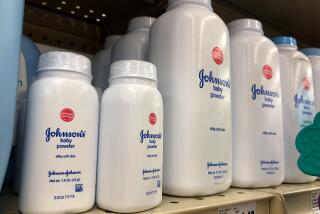Jury: Tampon Caused Death, but Company Is Not Liable : Verdict: The family of an Anaheim woman, who died of toxic shock syndrome, had sought $9 million in damages.
- Share via
SANTA ANA — An Orange County Superior Court jury ruled Monday that an Anaheim woman died of toxic shock syndrome caused by the tampon she used but also concluded that the manufacturer is not liable for damages.
Several jurors said outside the courtroom that they wanted to award money to the family of Dolores Shea, who died at the age of 30 on Oct. 5, 1989, leaving behind a husband and three children.
But during deliberations, some jurors felt the complex jury instructions and 16-question verdict form did not leave them that option, five jurors said in interviews Monday. Moreover, a majority concluded that while the tampon was defective, the manufacturer could not be held liable because Shea’s death could not have been foreseen, the jurors said.
“I just feel terrible about this, I really do,” said juror Les Lallo, a firefighter from Los Alamitos. “But we were just backed into a corner.”
Michael Shea, Dolores’ husband, stormed out of the courtroom after the verdict was announced. The unemployed father of children ranging in age from 4 to 13 said he was more interested in publicizing the threat of toxic shock syndrome than seeking monetary damages.
“It was never the money, but getting the word out that tampons are deadly,” said Michael Shea, who said he now warns strangers in supermarkets about the hazards of tampons. “I don’t want to see anyone else go through this.”
Dolores Shea became ill on Oct. 3, 1989, but believed that she had come down with the flu. Within hours, she fell into a coma and later died.
“There’s just not enough awareness about this,” Michael Shea said outside the courtroom.
Jean Allen, director of corporate communications for Kimberly-Clark, manufacturer of the Playtex Security tampon Dolores Shea used shortly before her death, said the verdict proves that the tampons are safe.
“While our sympathies are with the family of Mrs. Shea, we are grateful the jury has confirmed Kimberly-Clark’s belief that our product is safe,” Allen said.
Attorney Phillip W. Neiman, who represented the Shea family and asked for $9 million in damages, said he believes that many jurors meant well but misread the questions on the document on which they give their verdict. Neiman said he plans to appeal the verdict.
Neiman also charged that tampon manufacturers have chosen profits over safety, contending that safer tampons would cost more to produce.
“I’ve just never seen a verdict like this, where the jury determines a product is defective, a death resulted from that defect, but the manufacturer is not liable for damages,” Neiman said.
But three jurors who declined to give their names said they believed that Shea may have improperly used the product by not removing it or calling a doctor immediately after becoming ill.
The three jurors said they felt that product warnings serve as adequate notice that use of the product can be dangerous, relieving the manufacturer of liability.
Dr. Andrea Rapkin, associate professor of obstetrics and gynecology at UCLA Medical School, said toxic shock syndrome is a rare disorder that affects three out of every 100,000 pre-menopausal women. It can cause high fever, vomiting, shock, and--in severe cases--death.
Women have been advised to carefully follow the warnings printed on tampon boxes in the wake of the toxic shock syndrome outbreak of the 1980s that caused one manufacturer, Rely, to leave the market.
In interviews Monday, jurors said that during deliberations they struggled over the legal definitions of terms such as defect . Their request for the use of a dictionary during deliberations was denied. The judge changed the verdict form used by jurors several times in response to their questions, Neiman said.
“They were just confused by the whole thing, and I don’t blame them. It was confusing,” Neiman said.
Jurors deliberated over five days before reaching their decision but still could not agree on every issue. In civil cases, only nine jurors must agree in order to reach a verdict.
Jury forewoman Patty Guy, a Huntington Beach homemaker, said the case has been a learning experience for her.
“Before this, I thought that toxic shock was something that happened in the early 1980s and went away. I had no idea that it still exists,” she said, adding that she plans to seek a medical test that will tell her whether she is a likely candidate for the illness.
“We really felt for the family, we really did,” she said.
More to Read
Sign up for Essential California
The most important California stories and recommendations in your inbox every morning.
You may occasionally receive promotional content from the Los Angeles Times.














